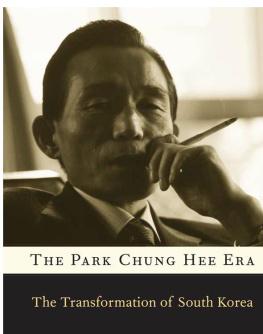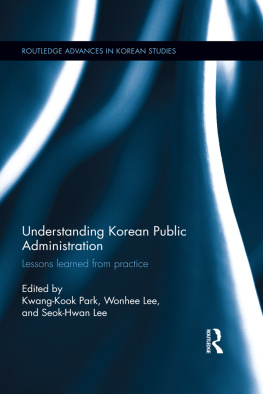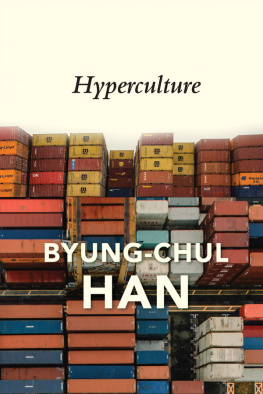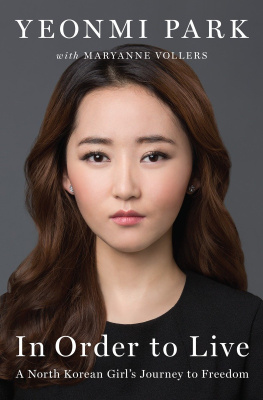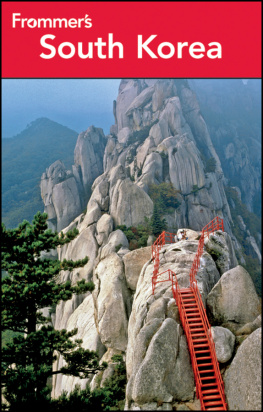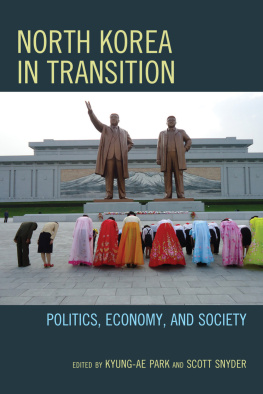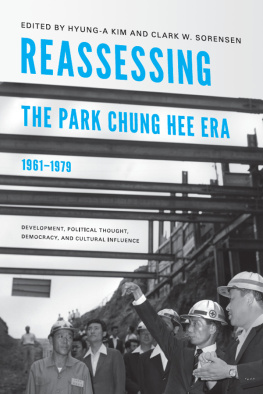
The Park Chung Hee Era
THE PARK CHUNG HEE ERA
The Transformation of South Korea
Edited by
BYUNG-KOOK KIM
EZRA F. VOGEL
HARVARD UNIVERSITY PRESS
Cambridge, Massachusetts
London, England
2011
Copyright 2011 by the President and Fellows of Harvard College All rights reserved
Printed in the United States of America
Library of Congress Cataloging-in-Publication Data The Park Chung Hee era : the transformation of South Korea / edited by Byung-Kook Kim and Ezra F. Vogel.
p.
cm.
Includes bibliographical references and index.
ISBN 978-0-674-05820-0 (alk. paper)
1. Korea (South)Politics and government19601988.
2. Park, Chung Hee, 19171979.
3. Comparative governmentCase studies.
I. Kim, Pyong-guk, 1959 Mar. 18
II. Vogel, Ezra F.
DS922.35.P336
2011
951.95043092dc22
2010038046
Contents
Introduction: The Case for Political History 1
Byung-Kook Kim
part one
Born in a Crisis
The May Sixteenth Military Coup
Yong-Sup Han
Taming and Tamed by the United States
Taehyun Kim and Chang Jae Baik
State Building: The Military Juntas Path
to Modernity through Administrative Reforms 85
Hyung-A Kim
part two
Politics
Modernization Strategy: Ideas and Influences 115
Chung-in Moon and Byung-joon Jun
The Labyrinth of Solitude: Park and the
Exercise of Presidential Power
Byung-Kook Kim
The Armed Forces
Joo-Hong Kim
The Leviathan: Economic Bureaucracy
under Park
Byung-Kook Kim
The Origins of the Yushin Regime:
Machiavelli Unveiled
Hyug Baeg Im
Contents
vi
part three
Economy and Society
The Chaebol
Eun Mee Kim and Gil-Sung Park
The Automobile Industry
Nae-Young Lee
Pohang Iron & Steel Company
Sang-young Rhyu and Seok-jin Lew
The Countryside
Young Jo Lee
The Chaeya
Myung-Lim Park
part four
International Relations
The Vietnam War: South Koreas Search
for National Security
Min Yong Lee
Normalization of Relations with Japan:
Toward a New Partnership
Jung-Hoon Lee
The Security, Political, and Human Rights
Conundrum, 19741979
Yong-Jick Kim
The Search for Deterrence:
Parks Nuclear Option
Sung Gul Hong
part five
Comparative Perspective
Nation Rebuilders: Mustafa Kemal Atatrk,
Lee Kuan Yew, Deng Xiaoping, and
Park Chung Hee
Ezra F. Vogel
Reflections on a Reverse Image:
South Korea under Park Chung Hee and
the Philippines under Ferdinand Marcos
Paul D. Hutchcroft
Contents
vii
The Perfect Dictatorship? South Korea
versus Argentina, Brazil, Chile, and Mexico 573
Jorge I. Domnguez
Industrial Policy in Key Developmental Sectors: South Korea versus Japan and Taiwan
Gregory W. Noble
Conclusion: The Post-Park Era
Byung-Kook Kim
Notes
Acknowledgments
List of Contributors
Index of Persons
Introduction:
The Case for Political History
Byung-Kook Kim
Few periods have changed South Korean history more than the Park era that began in May 1961 with a military coup dtat. The nature of leadership, the political parties and political opposition, the bureaucracy, the armed forces, relations between workers and farmers and their government, the chaebol industrial conglomerates, foreign policy
all were transformed. Meanwhile, economically South Korea grew out of poverty into an industrial powerhouse in one generation, albeit with massive political, social, and economic costs. And after the Park era suddenly ended in 1979, the reactions to what had taken place transformed the country once more.
The eighteen-year Park era has proved to be one of the most, if not the most, controversial topics for the Korean public, politicians, and scholars both at home and abroad. How much was the economic takeoff fueled by changes in the political and social fabric? To what degree was Park Chung Hee personally responsible for the transformationboth political and economicacross multiple sectors? Why did South Koreas political regime drift toward hard authoritarianism while its economy modernized at a hyper pace? Were these changes causally related? Why was his era marked by both dazzling policy successes and spectacular failures? How much were South Koreas successes and failures explained by its historically antecedent conditions? As one of a handful of newly industrializing countries (NICs) that succeeded in economically catching up with early de
Introduction
2
velopers and militarily building up a system of deterrence, but at huge costs, South Korea is a crucial case in understanding the politics of modernization.
This volume revisits South Koreas developmental era, but it distinguishes itself from other works on the nations rebirth after 1961 by placing its analytic focus on political history. We have chosen political history for three reasons. First, although South Koreas macroeconomic indicators show a country continually undergoing a spectacular industrial transformation, its trajectory of modernization was anything but stable. The macroeconomic indicators covered up a deep sense of insecurity and vulnerability pervading South Korea. The high-payoff, high-risk strategy of subsidizing growth through bureaucratically distributed policy loans burdened banks with huge nonperforming loans, thus entrapping the economy in a cycle of boom and bust and presenting the South Korean leadership with hard policy choices in 1972 and 1979. The volatile swings in this U.S. allys global, regional, and peninsular strategy aggravated or ameliorated South Koreas security dilemmas in 1961, 1964, 1969, and 1976, which triggered its policymakers need to reassess competing budgetary priorities between military and economic programs. Most critical, Park Chung Hee was at first supposed to step down in 1971 and, after a constitutional revision to allow his third presidential term, in 1975. Whether he would do so was to have profound impacts on South Koreas regime character and, hence, its strategy of modernization. The choice made at each of these critical junctures, determining South Koreas subsequent path of economic growth, was heavily shaped by politics.
Second, we focus on political history because at many of the critical junctures, for South Korea to succeed at the state building, military security improvements, and market formation upon which its prospect for hypergrowth depended, the resolution of problems and issues could only come from its top political authorities attempt at juggling the competing claims of geopolitics, geoeconomics, and domestic politics. To explain South Koreas power realignments between state ministries away from its intrinsically conservative Ministry of Finance (MoF) in 1962, 1965, and 1973, or toward the MoF in 1969, 1972, and 1979, we must examine how political leaders controlled state bureaucrats. State ministries, if left alone, only produce a deadlock of interests or a gradual adjustment of interests.1
To explain the chaebol conglomerates risk-taking behavior, one must look into what kind of incentives they had that made taking risks a rational strategy from their perspective and why those incentives were dangled in front of them in the first place. Such inquiries require an analysis of Park Chung Hee and his top aides political goals, calculations, and strategies.
Next page
